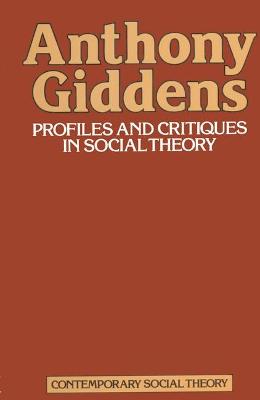Contemporary social theory
4 total works
Profiles and Critiques in Social Theory
by Anthony Giddens and Fred R. Dallmayr
Published 17 February 1983
In this new and brilliantly organized book of essays, Anthony Giddens discusses three main theoretical traditions in social science that cut across the division between Marxist and non-Marxist sociology: interpretive sociology, functionalism, and structuralism. Beginning with a critical examination of the importance of structuralism for contemporary sociology, the author develops a comprehensive account of what he calls 'the theory of structuration.' One of the main themes is that social theory must recognize, as it has not done hitherto, that all social actors are knowledgeable about the social systems they produce and reproduce in their conduct. In order to grasp the significance of this, he argues, we have to reconsider some of the most basic concepts in sociology. In particular, Giddens argues, it is essential to recognize the significance of time-space relations in social theory. He rejects the distinction between synchrony and diachrony, or statics and dynamics, involved in both structuralism and functionalism, and offers extensive critical commentary on the latter as an approach to sociology.
The book, which can be described as a 'non-functionalist manifesto,' breaks with the three main theoretical traditions in the social sciences today while retaining the significant contributions each contains. In so doing Giddens discusses a range of fundamental problem areas in the social sciences: power and domination, conflict and contradiction, and social transformation. He concludes with an overall appraisal of the key problems in social theory today.
The book, which can be described as a 'non-functionalist manifesto,' breaks with the three main theoretical traditions in the social sciences today while retaining the significant contributions each contains. In so doing Giddens discusses a range of fundamental problem areas in the social sciences: power and domination, conflict and contradiction, and social transformation. He concludes with an overall appraisal of the key problems in social theory today.
This powerful critique of Marx's historical materialism - as a theory of power, as an account of history, and as a political theory -has been revised to take note of the profound intellectual and political changes that have occurred since the first edition was published. Reviews from the first edition 'Giddens draws upon a formidable knowledge of anthropology, archaeology, geography, and philosophy to demonstrate the limitations of Marxism and to formulate his own interpretation of the history of societies ...He does a masterful job of setting his theory within a historical and critical framework of writings on Marx. His clarity of thought and his deft and often humorous handling of the unavoidable jargon of sociology and Marxist political theory makes this book a critical work of the highest quality.' Journal of International Law and Politics 'By contrast with many practictioners in the rather murky area of social theory, Giddens clearly seeks to make himself understood, and he has the useful quality of provoking one to argument. He has let light into some dark places.'
The Times Higher Education Supplement 'Although Marx, Durkheim, and Weber continue to fill more index space than any other authors, Critique is Giddens's most explicit and committed statement of his own conceptualization of social theory ...It is his most original and therefore most vulnerable book, at once a cause for celebration and an invitation to critical reappraisal of the author's entire theoretical project.' E
The Times Higher Education Supplement 'Although Marx, Durkheim, and Weber continue to fill more index space than any other authors, Critique is Giddens's most explicit and committed statement of his own conceptualization of social theory ...It is his most original and therefore most vulnerable book, at once a cause for celebration and an invitation to critical reappraisal of the author's entire theoretical project.' E
'...excellent: concise and clear. Overall, this is a recommended source book, well-planned, presented and edited.' Alan Jenkins, British Book News

